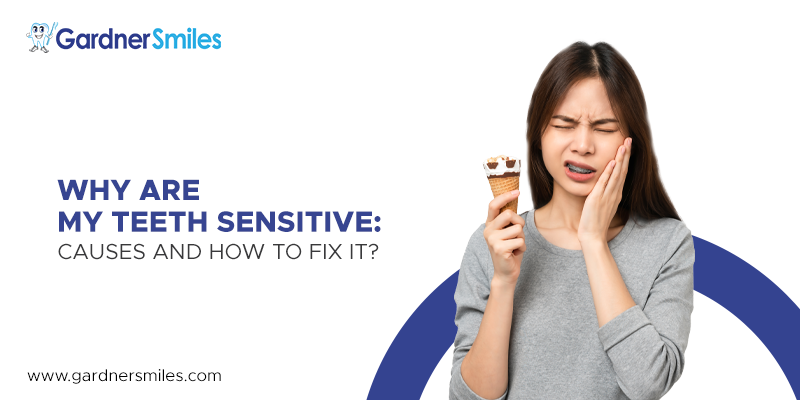Have you ever had that zing of discomfort shoot through your teeth with a bite of your favorite ice cream, or perhaps a sip of hot coffee caused severe pain in your teeth? Or maybe you noticed that brushing your teeth has become more uncomfortable than usual. It’s almost like the teeth are begging for some attention and is a sure sign of teeth sensitivity. However, it also has no reason to panic! Sensitive teeth are a fairly common dental issue with many potential reasons behind it. Read through this blog to understand the reasons behind teeth sensitivity and how to overcome it.
Why are My Teeth Sensitive?
The tooth structure comprises of three layers: the enamel( outer harder surface), dentin(the second layer), and pulp(the innermost layer). The layer of enamel on the surface and cementum below the gum line protects the dentin. When the enamel or cementum wears out, they expose the dentin to harsh temperatures, bacteria, or other external stimuli. Dentin is the second layer of teeth that is soft and porous and covers the nerve fibers in the pulp. Experts at Gardner Smiles, a leading dental clinic explain that any stimulus to the exposed dentin causes the nerves to respond, resulting in sensitive teeth. Teeth sensitivity may also be a sign of other dental issues, including cavities and gum diseases.
What Causes Teeth Sensitivity?
There are a plethora of reasons for an individual to experience teeth sensitivity. It is best to consult your dentist to know the reason behind your teeth sensitivity. However, some of the most prevalent causes of teeth sensitivity include:
Brushing Your Teeth too Hard
Over-brushing, using a stiff bristle brush, or scrubbing rigorously may lead to enamel damage and even cause gum recession. The worn-out enamel and gum recession leave your dentin layer exposed, thus resulting in sensitive teeth. Therefore, use a soft-bristled brush to brush and clean your teeth gently.
Over Whitening Your Teeth
The teeth whitening products and treatments are generally quite safe. But despite being safe and prevalent, teeth whitening leads to temporary sensitivity in teeth. Most whitening treatments lead to the opening of microscopic pores in your enamel to let the treatment reach up to dentin. These pores close eventually, but avoiding hot or cold foods and drinks until then is the best.
It is best to avoid using many at-home whitening treatments and consult your dentist before indulging in any teeth whitening methods.
Gum/ Periodontal Disease
Another common reason for sensitive teeth is periodontal disease. Gum diseases do not have a lot of symptoms before they have progressed too far, but teeth sensitivity is one. Gum disease leads to gum recession and weakening of cementum. This exposes the dentin to harsh outer elements, thus causing sensitive teeth. The ultimate guide to gum disease stages will help you better identify the symptoms and understand it.
Dental Cavities, Broken or Chipped Teeth
Minor sensitivity when eating acidic, hot, or cold foods is a sign of dental cavities. The bacteria damage the enamel, thus causing the tooth to become sensitive. Over time, the bacteria eats away the enamel and travels up to the pulp, causing severe teeth sensitivity and pain.
Similarly, broken or chipped teeth may expose the dentin or even the pulp of teeth to external stimuli, thus causing excruciating pain and sensitivity. Your dentist can provide you with more information about how to fix chipped teeth.
Bruxism (Teeth Grinding)
Irrespective of whether you grind your teeth unconsciously while sleeping or it is your reflex in stressful conditions, teeth grinding results in enamel damage. This damage will gradually expose your dentin, thus leading to teeth sensitivity. You can consult your dentist and consider wearing a mouthguard for protection against further damage.
Regular Intake Of Acidic Foods And Drinks
In the long run, over indulgence in acidic foods without optimum oral care can lead to damaged enamel and weakened gum line. This ultimately exposes the dentin to an acidic environment and, thus, sensitive teeth. So, while you enjoy pickles, tomatoes, yogurt, sodas, etc., consume them in moderate quantities and practice proper oral care.
Acid Reflux
So, your oral health depends not only on what you put in your mouth but also on the health of other body parts. It is common to experience acid reflux due to gastroesophageal disease, but this reflux can cause severe damage to your teeth. Consult a healthcare professional to ease the acid reflux and prevent the erosion that leads to sensitive teeth.
Loose Dental Fillings
Dental fillings that go loose are also responsible for getting tooth sensitivity. Without the filling protecting the inner layers of your tooth, the inside of the tooth is exposed to bacteria, acids, temperature, and pressure. So, if you feel any sensitivity in previously treated teeth, contact your dentist as soon as possible.
Recent dental treatments
Intrusive dental procedures like cleanings, root canals, crown placement, or tooth restoration may temporarily leave your teeth feeling sensitive. However, your dentist will educate you about the duration you may experience it. If the sensitivity does not go, reach out to your doctor for a solution.
Regular intake of certain medication
Medicines such as inhalers, aspirins, antihistamines, antibiotics, and sugar-based medicines impact your enamel and can lead to deterioration over time. So, if you feel medicine is the reason for your sensitive teeth, consult your doctor for a solution.
Make sure to follow your oral routine meticulously to avoid issues like teeth sensitivity. It would be best to avoid acidic mouthwash, as it can lead to damaged enamel.
What Does Tooth Sensitivity Feel Like?
Tooth sensitivity feels different for every individual. Some people may only feel a slight tingle in the gums; others may experience sharp shooting pains. But in more general terms, the common description of sensitive teeth includes a sudden and sharp toothache in response to certain triggers like:

- Physical Triggers – Physical triggers include brushing harshly or eating hard foods that may result in sudden pain or discomfort.
- Temperature triggers – If you suffer from sensitive teeth, temperature sensitivity is a common symptom. Intaking food or drinks that are too hot or too cold may result in discomfort or shooting pain.
- Chemical triggers – Chemical triggers include the response of your teeth to sugar and acid. Products like teeth-whitening pastes, strips, or gel trays may sometimes trigger discomfort or pain.
How to Fix Sensitive Teeth?
Sensitivity in teeth does not vanish on its own, but certain effective treatments are available to elevate it. The effectiveness of these treatments depends on the reason for the sensitivity. Here are a few things that can significantly impact your teeth.
Brushing the teeth properly with toothpaste for sensitive teeth
Using the right toothbrush and following proper brushing techniques is important to maintain healthy and clean teeth. Along with this, the composition of your toothpaste also matters. You can consult your dentist and use a toothpaste that lessens the sensitivity when used regularly.
Take care of what you eat
You may choose not to believe us, but what you eat significantly impacts your oral health. So, if you are experiencing teeth sensitivity, it would be wise to cut down on acidic and citrus foods and drinks. You don’t have to eliminate these things; just limit it to a more reasonable amount. You can rinse your mouth thoroughly after every meal and use straws for drinking acidic beverages.
Keep up with your dental checkups
Any discomfort you experience in your teeth or gums is a reason to visit your dentist. They can help you manage the sensitivity and, more importantly, identify and treat the underlying issues. In some cases, if the general remedies fail to cure the sensitivity, the dentist may suggest some options like gum disease treatments, bonding treatments, or grafting techniques like:
- Fluoride gel, rinses, or varnishes – Concentrated forms of fluoride on repeated application can strengthen enamel and dentin.
- Bonding – Dentists may apply a bonding resin or other such substance to cover the sensitive areas of your teeth and protect them from further damage.
- Gum graft – If you have sensitivity due to lost gum tissue, your dental care provider may use the gum graft technique to cover and protect the exposed roots.
Do I Need to Go and See My Dentist?
Yes, as explained above, if the home remedies do not provide your relief from teeth sensitivity, it is best to visit a dentist. Your dentist will find and treat the root cause behind your sensitive teeth.
Is There Anything I Should Avoid If I Have Sensitive Teeth?
Yes absolutely! You can limit the intake of acidic and sugary foods as they cause further damage. Also, go easy on your teeth while brushing and avoid using stiff brushes and abrasive methods. They can make the situation worse.
Who Suffers from Sensitive Teeth?
Many people suffer from sensitive teeth irrespective of age. However, it is more common between the ages of 20 to 40. Tooth sensitivity occurs due to numerous reasons like gum disease, cavities, aggressive brushing, etc. It is a general observation that women are more prone to teeth sensitivity than men.
How Long Does Teeth Sensitivity Last?
You likely need dental treatment if you have sensitive teeth due to worn-out enamel, cracked teeth, gum disease, or receded gums. However, if the sensitivity occurs after some dental treatment, it is generally temporary and goes away in a few days.
Can Clenching and Grinding Teeth Cause Tooth Sensitivity?
Clenching and grinding excessively causes extreme pressure on the teeth and surrounding structures. The situation eventually leads to enamel deterioration and gum recession. The result of clenching and grinding is, therefore, teeth sensitivity in maximum cases.
Overly sensitive teeth can make even simple things like brushing and flossing seem discouraging. So, if you feel any slight discomfort or pain in your teeth or are due a dental appointment, make it a priority to schedule your consultation with Gardner Smiles, the best dental clinic across Gardner, MA.





